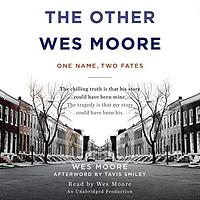Take a photo of a barcode or cover
Underwhelming. I was excited when the librarian at my school handed this to me last year. I was even more excited as I got into the opening section or two. The further I read, though, the less engrossed I became. Moore's writing is stiff, for one, and the promised payoff of a meaningful relationship between the two men never seemed to materialize. The reporting about the convicted man's various travails with the law and with rehabilitation was certainly the book's strength, even if Moore's account of his own coming of age was rather bland. By the end of the book, I was hoping to see more about some of the reflective exchanges the two men must have shared during their visits. What I found instead were awkward passages in which Moore tried to be humble about his accomplishments but ended up coming across (to me, anyway) as a bit pompous. Not that he doesn't have plenty of which to be proud -- he does, and I don't begrudge him that. He just didn't write the book I had hoped to be reading.
*Pretty good side note: In Chapter Four, Moore describes some of the drug dealing that Wes and Tony involve themselves in. At one point, he references "ready rock," or crack. I had never heard this term before, but shortly after reading it for the first time, I was umpiring a first-round playoff baseball game between Baltimore high schools Douglass and Northwestern. In talking up some in-game enthusiasm for his teammates, the first baseman for one of the teams kept shouting, "READY READY READY!" before each pitch. This continued for a few batters before the rightfielder, either amused or annoyed or both, chimed in and said, "C'mon yo, you sound like you standin' on somebody corner!" In 25-plus years of baseball, that is easily the funniest thing I have ever heard on a diamond, and I have this book to thank for it.*
Top quotes:
"She jumped into the melting pot with both feet."
"I love you and I am proud of you. And, Wes, it's time to stop running." ---Wes's mom
"So many opportunities in this country are apportioned in [an] arbitrary and miserly way, distributed to those who already have the benefit of a privileged legacy."
*Pretty good side note: In Chapter Four, Moore describes some of the drug dealing that Wes and Tony involve themselves in. At one point, he references "ready rock," or crack. I had never heard this term before, but shortly after reading it for the first time, I was umpiring a first-round playoff baseball game between Baltimore high schools Douglass and Northwestern. In talking up some in-game enthusiasm for his teammates, the first baseman for one of the teams kept shouting, "READY READY READY!" before each pitch. This continued for a few batters before the rightfielder, either amused or annoyed or both, chimed in and said, "C'mon yo, you sound like you standin' on somebody corner!" In 25-plus years of baseball, that is easily the funniest thing I have ever heard on a diamond, and I have this book to thank for it.*
Top quotes:
"She jumped into the melting pot with both feet."
"I love you and I am proud of you. And, Wes, it's time to stop running." ---Wes's mom
"So many opportunities in this country are apportioned in [an] arbitrary and miserly way, distributed to those who already have the benefit of a privileged legacy."
hopeful
reflective
fast-paced
“The choices we make. The people we become.”
Just finished The Other Wes Moore — a powerful true story about two boys with the same name, raised in similar circumstances, but whose lives take drastically different paths.
This book is more than a biography — it’s a mirror. It asks: What if one decision could define the rest of your life?
challenging
emotional
hopeful
informative
inspiring
medium-paced
hopeful
informative
reflective
medium-paced
The book sounded interesting when I first picked it up but fell flat rather quickly. Two people having the same name isn't interesting to me, at least inherently. The Wes Moores had different support structures, family connections or disconnections, and external factors pushing them to their choices. They can be compared, I suppose, but could one Wes have become the other? Probably not. I think the author had good intentions originally but I'm unsure if they were executed well.
I wanted to like this memoir/biography more. Two black Wes Moores lived in Baltimore at the same time and are the same age. One ended up in prison, and one ended up "successful."
The families are different, but early on both Wes Moores got in trouble. The "successful" one and the author of the book lost his father as a young boy, and he went to a private military academy and got on the "right" path while the other, well, became a statistic.
While the concept of this book is good, I wasn't fond of the execution. It was a muddled book, and I thought the author would go into more depth than he did. What is he attributing his accomplishments to? Military school? A supportive family? An immigrant family who learned quickly that education was important?
I'm sure I can find someone nearby with my same name (actually, there was a woman 15 houses away who shared my same name), and then I can write a book about how we ended up being different people despite sharing a name.
The families are different, but early on both Wes Moores got in trouble. The "successful" one and the author of the book lost his father as a young boy, and he went to a private military academy and got on the "right" path while the other, well, became a statistic.
While the concept of this book is good, I wasn't fond of the execution. It was a muddled book, and I thought the author would go into more depth than he did. What is he attributing his accomplishments to? Military school? A supportive family? An immigrant family who learned quickly that education was important?
I'm sure I can find someone nearby with my same name (actually, there was a woman 15 houses away who shared my same name), and then I can write a book about how we ended up being different people despite sharing a name.
challenging
emotional
hopeful
inspiring
fast-paced
An intriguing idea about the power of one's behavior combined with environment.
This was an interesting look into how two boys from the same block can take slightly different paths and have such contrasting life outcomes. I personally read the book because the author is from my hometown—Baltimore. While it was a good read, I feel like he never answered his own question: where did the other Wes Moore exactly go wrong? Is there even a real answer for this or is it just his misfortune? The reader can assume this from reading of course, but the author asks this question in the beginning of the text and it would have been nice to see his own answer, why he thinks the other Wes Moore had poorer fate.
dark
informative
fast-paced






